Integrated Approach to Counselling: Personal and Professional Balance
VerifiedAdded on 2022/09/26
|12
|3214
|29
Report
AI Summary
This report is a position paper on an integrated approach to counselling, exploring the balance between personal and professional aspects. The paper begins with an introduction to the field of counselling and the importance of mental well-being, highlighting the role of professional counselors. It defines integrative counselling and its combination of various therapeutic elements, emphasizing the need to treat each client as a whole person. The paper then reflects on the author's emerging approach to integrative practice, discussing the importance of the client-counselor relationship and the ethical challenges of maintaining a balance between personal and professional aspects. Arguments in favor of maintaining this balance, such as impartial judgment and the development of unique counseling practices, are presented. The author uses an eclectic approach, integrating various techniques based on client needs, including person-centric, psychodynamic, and cognitive behavioral approaches. However, the paper also acknowledges arguments against maintaining a strict divide, emphasizing the importance of understanding the client's psyche and the potential for confusion if the counselor is not aware of the client's personal life. The paper concludes by summarizing the key arguments and providing a balanced perspective on the integrated approach to counseling.
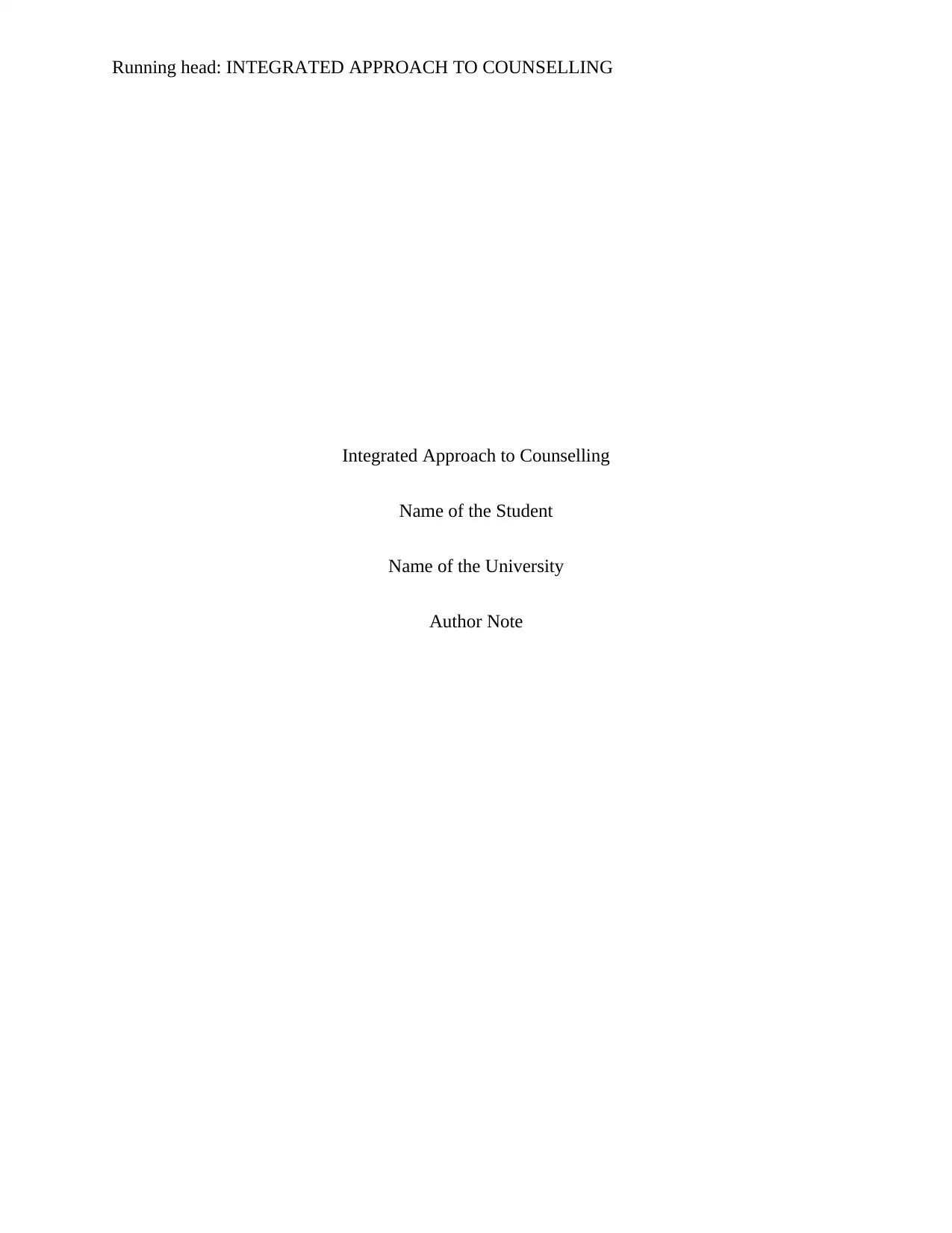
Running head: INTEGRATED APPROACH TO COUNSELLING
Integrated Approach to Counselling
Name of the Student
Name of the University
Author Note
Integrated Approach to Counselling
Name of the Student
Name of the University
Author Note
Paraphrase This Document
Need a fresh take? Get an instant paraphrase of this document with our AI Paraphraser
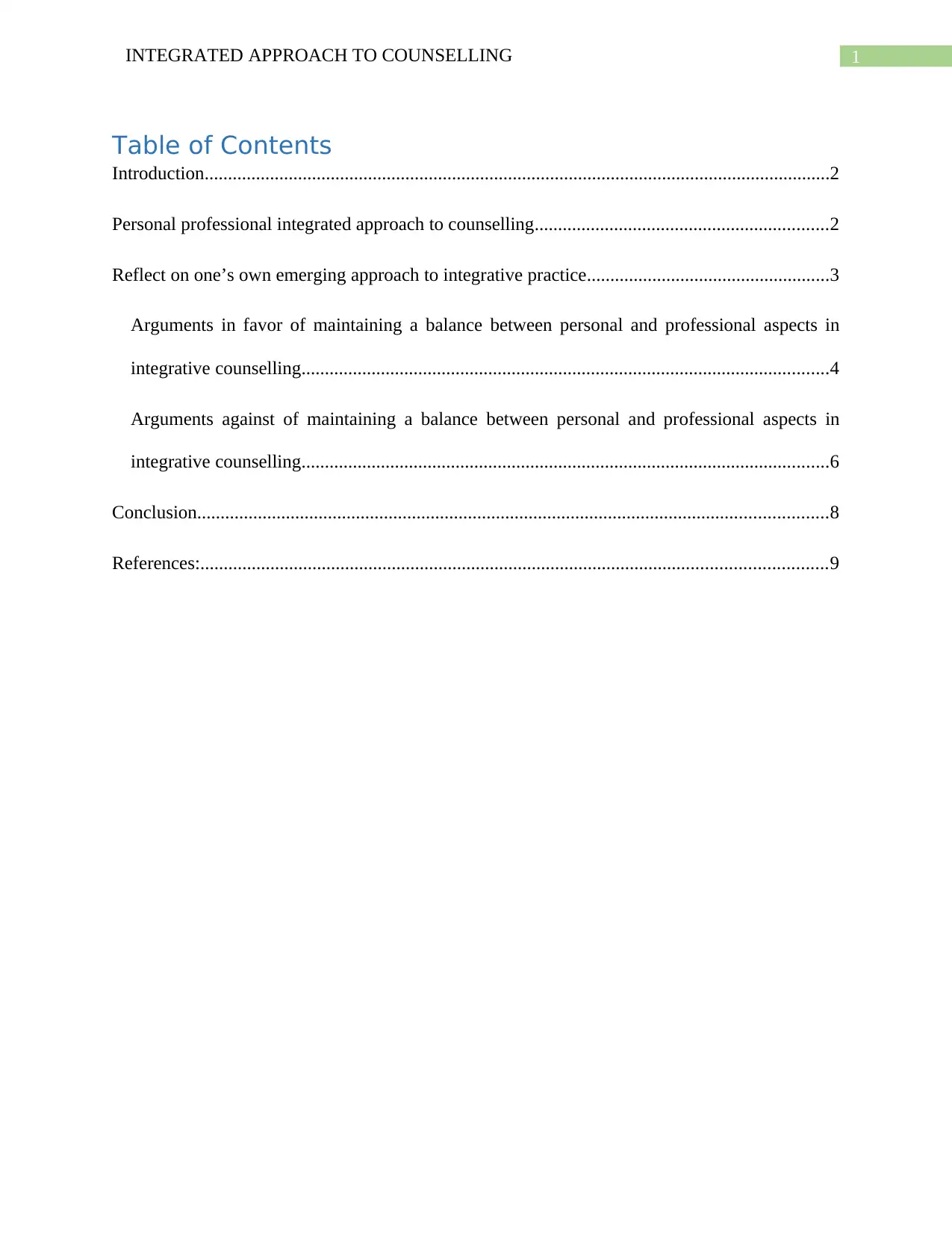
1INTEGRATED APPROACH TO COUNSELLING
Table of Contents
Introduction......................................................................................................................................2
Personal professional integrated approach to counselling...............................................................2
Reflect on one’s own emerging approach to integrative practice....................................................3
Arguments in favor of maintaining a balance between personal and professional aspects in
integrative counselling.................................................................................................................4
Arguments against of maintaining a balance between personal and professional aspects in
integrative counselling.................................................................................................................6
Conclusion.......................................................................................................................................8
References:......................................................................................................................................9
Table of Contents
Introduction......................................................................................................................................2
Personal professional integrated approach to counselling...............................................................2
Reflect on one’s own emerging approach to integrative practice....................................................3
Arguments in favor of maintaining a balance between personal and professional aspects in
integrative counselling.................................................................................................................4
Arguments against of maintaining a balance between personal and professional aspects in
integrative counselling.................................................................................................................6
Conclusion.......................................................................................................................................8
References:......................................................................................................................................9
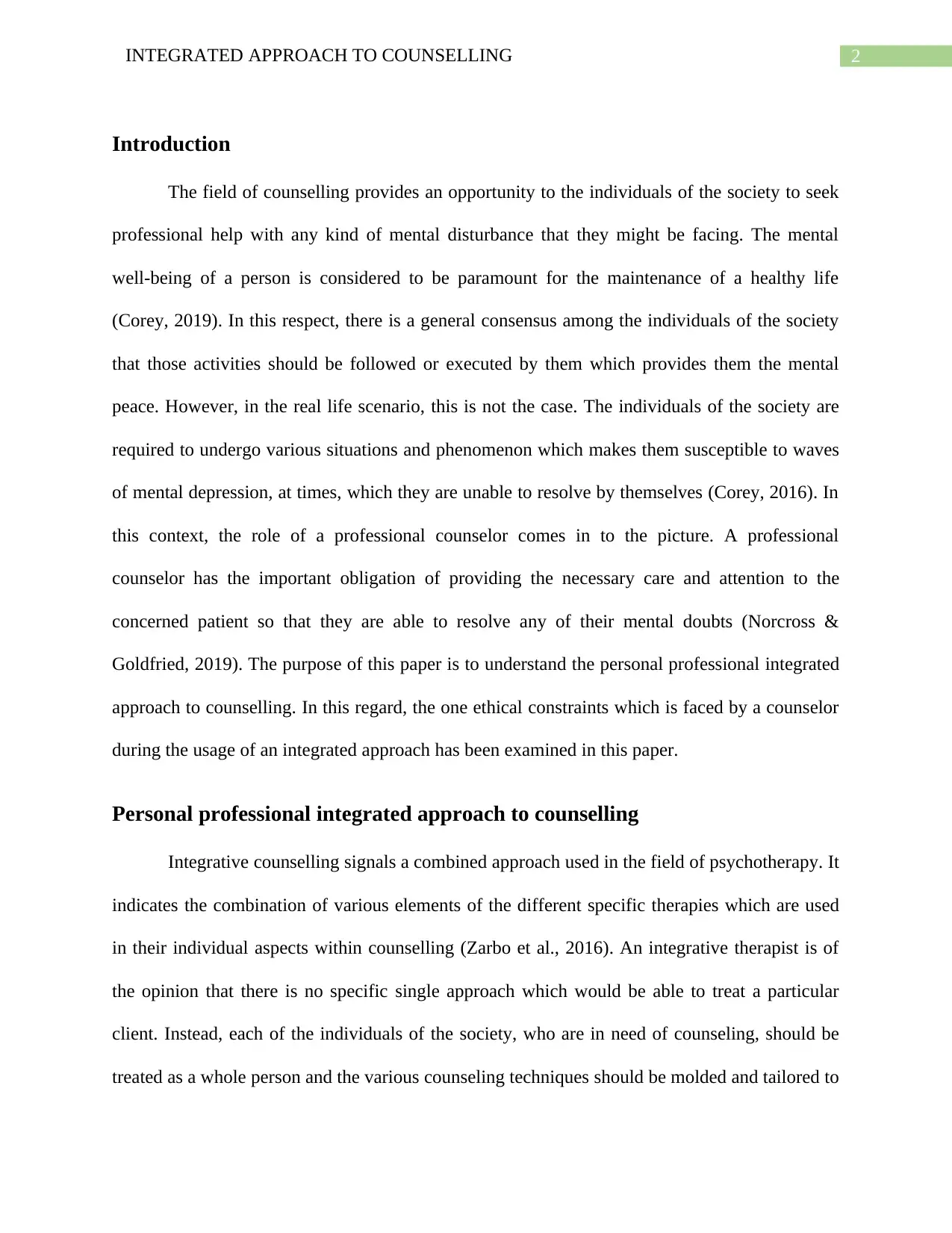
2INTEGRATED APPROACH TO COUNSELLING
Introduction
The field of counselling provides an opportunity to the individuals of the society to seek
professional help with any kind of mental disturbance that they might be facing. The mental
well-being of a person is considered to be paramount for the maintenance of a healthy life
(Corey, 2019). In this respect, there is a general consensus among the individuals of the society
that those activities should be followed or executed by them which provides them the mental
peace. However, in the real life scenario, this is not the case. The individuals of the society are
required to undergo various situations and phenomenon which makes them susceptible to waves
of mental depression, at times, which they are unable to resolve by themselves (Corey, 2016). In
this context, the role of a professional counselor comes in to the picture. A professional
counselor has the important obligation of providing the necessary care and attention to the
concerned patient so that they are able to resolve any of their mental doubts (Norcross &
Goldfried, 2019). The purpose of this paper is to understand the personal professional integrated
approach to counselling. In this regard, the one ethical constraints which is faced by a counselor
during the usage of an integrated approach has been examined in this paper.
Personal professional integrated approach to counselling
Integrative counselling signals a combined approach used in the field of psychotherapy. It
indicates the combination of various elements of the different specific therapies which are used
in their individual aspects within counselling (Zarbo et al., 2016). An integrative therapist is of
the opinion that there is no specific single approach which would be able to treat a particular
client. Instead, each of the individuals of the society, who are in need of counseling, should be
treated as a whole person and the various counseling techniques should be molded and tailored to
Introduction
The field of counselling provides an opportunity to the individuals of the society to seek
professional help with any kind of mental disturbance that they might be facing. The mental
well-being of a person is considered to be paramount for the maintenance of a healthy life
(Corey, 2019). In this respect, there is a general consensus among the individuals of the society
that those activities should be followed or executed by them which provides them the mental
peace. However, in the real life scenario, this is not the case. The individuals of the society are
required to undergo various situations and phenomenon which makes them susceptible to waves
of mental depression, at times, which they are unable to resolve by themselves (Corey, 2016). In
this context, the role of a professional counselor comes in to the picture. A professional
counselor has the important obligation of providing the necessary care and attention to the
concerned patient so that they are able to resolve any of their mental doubts (Norcross &
Goldfried, 2019). The purpose of this paper is to understand the personal professional integrated
approach to counselling. In this regard, the one ethical constraints which is faced by a counselor
during the usage of an integrated approach has been examined in this paper.
Personal professional integrated approach to counselling
Integrative counselling signals a combined approach used in the field of psychotherapy. It
indicates the combination of various elements of the different specific therapies which are used
in their individual aspects within counselling (Zarbo et al., 2016). An integrative therapist is of
the opinion that there is no specific single approach which would be able to treat a particular
client. Instead, each of the individuals of the society, who are in need of counseling, should be
treated as a whole person and the various counseling techniques should be molded and tailored to
⊘ This is a preview!⊘
Do you want full access?
Subscribe today to unlock all pages.

Trusted by 1+ million students worldwide
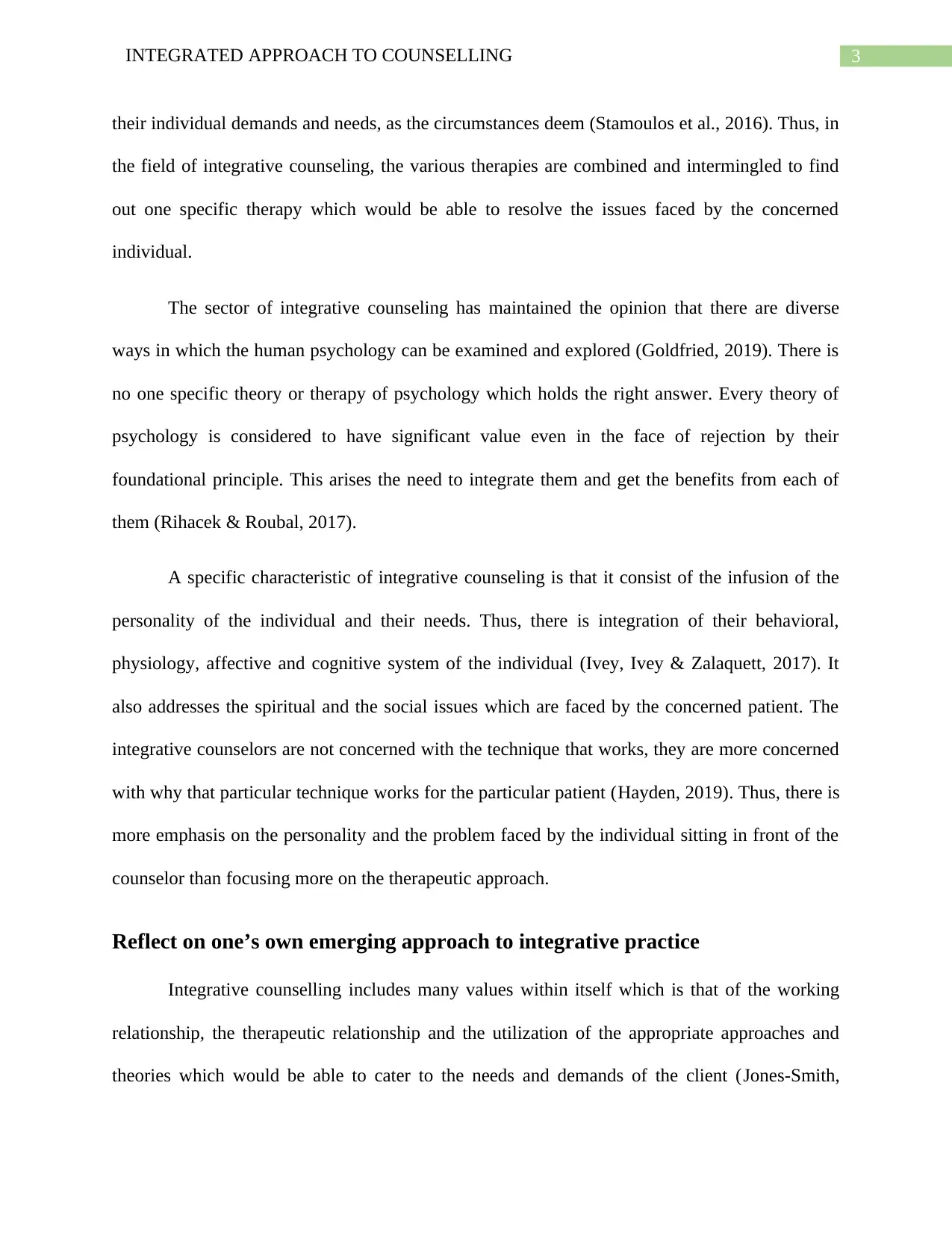
3INTEGRATED APPROACH TO COUNSELLING
their individual demands and needs, as the circumstances deem (Stamoulos et al., 2016). Thus, in
the field of integrative counseling, the various therapies are combined and intermingled to find
out one specific therapy which would be able to resolve the issues faced by the concerned
individual.
The sector of integrative counseling has maintained the opinion that there are diverse
ways in which the human psychology can be examined and explored (Goldfried, 2019). There is
no one specific theory or therapy of psychology which holds the right answer. Every theory of
psychology is considered to have significant value even in the face of rejection by their
foundational principle. This arises the need to integrate them and get the benefits from each of
them (Rihacek & Roubal, 2017).
A specific characteristic of integrative counseling is that it consist of the infusion of the
personality of the individual and their needs. Thus, there is integration of their behavioral,
physiology, affective and cognitive system of the individual (Ivey, Ivey & Zalaquett, 2017). It
also addresses the spiritual and the social issues which are faced by the concerned patient. The
integrative counselors are not concerned with the technique that works, they are more concerned
with why that particular technique works for the particular patient (Hayden, 2019). Thus, there is
more emphasis on the personality and the problem faced by the individual sitting in front of the
counselor than focusing more on the therapeutic approach.
Reflect on one’s own emerging approach to integrative practice
Integrative counselling includes many values within itself which is that of the working
relationship, the therapeutic relationship and the utilization of the appropriate approaches and
theories which would be able to cater to the needs and demands of the client (Jones-Smith,
their individual demands and needs, as the circumstances deem (Stamoulos et al., 2016). Thus, in
the field of integrative counseling, the various therapies are combined and intermingled to find
out one specific therapy which would be able to resolve the issues faced by the concerned
individual.
The sector of integrative counseling has maintained the opinion that there are diverse
ways in which the human psychology can be examined and explored (Goldfried, 2019). There is
no one specific theory or therapy of psychology which holds the right answer. Every theory of
psychology is considered to have significant value even in the face of rejection by their
foundational principle. This arises the need to integrate them and get the benefits from each of
them (Rihacek & Roubal, 2017).
A specific characteristic of integrative counseling is that it consist of the infusion of the
personality of the individual and their needs. Thus, there is integration of their behavioral,
physiology, affective and cognitive system of the individual (Ivey, Ivey & Zalaquett, 2017). It
also addresses the spiritual and the social issues which are faced by the concerned patient. The
integrative counselors are not concerned with the technique that works, they are more concerned
with why that particular technique works for the particular patient (Hayden, 2019). Thus, there is
more emphasis on the personality and the problem faced by the individual sitting in front of the
counselor than focusing more on the therapeutic approach.
Reflect on one’s own emerging approach to integrative practice
Integrative counselling includes many values within itself which is that of the working
relationship, the therapeutic relationship and the utilization of the appropriate approaches and
theories which would be able to cater to the needs and demands of the client (Jones-Smith,
Paraphrase This Document
Need a fresh take? Get an instant paraphrase of this document with our AI Paraphraser
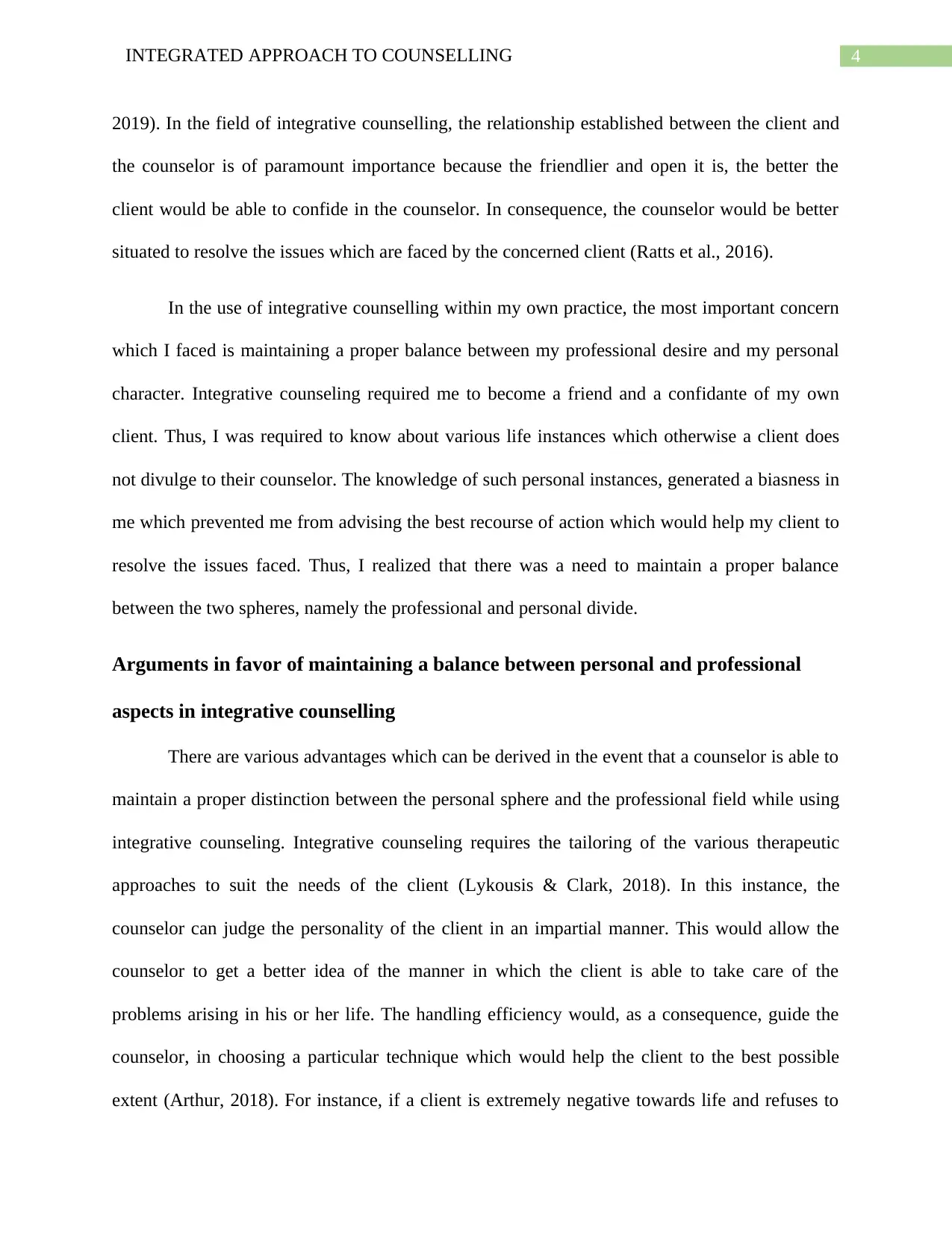
4INTEGRATED APPROACH TO COUNSELLING
2019). In the field of integrative counselling, the relationship established between the client and
the counselor is of paramount importance because the friendlier and open it is, the better the
client would be able to confide in the counselor. In consequence, the counselor would be better
situated to resolve the issues which are faced by the concerned client (Ratts et al., 2016).
In the use of integrative counselling within my own practice, the most important concern
which I faced is maintaining a proper balance between my professional desire and my personal
character. Integrative counseling required me to become a friend and a confidante of my own
client. Thus, I was required to know about various life instances which otherwise a client does
not divulge to their counselor. The knowledge of such personal instances, generated a biasness in
me which prevented me from advising the best recourse of action which would help my client to
resolve the issues faced. Thus, I realized that there was a need to maintain a proper balance
between the two spheres, namely the professional and personal divide.
Arguments in favor of maintaining a balance between personal and professional
aspects in integrative counselling
There are various advantages which can be derived in the event that a counselor is able to
maintain a proper distinction between the personal sphere and the professional field while using
integrative counseling. Integrative counseling requires the tailoring of the various therapeutic
approaches to suit the needs of the client (Lykousis & Clark, 2018). In this instance, the
counselor can judge the personality of the client in an impartial manner. This would allow the
counselor to get a better idea of the manner in which the client is able to take care of the
problems arising in his or her life. The handling efficiency would, as a consequence, guide the
counselor, in choosing a particular technique which would help the client to the best possible
extent (Arthur, 2018). For instance, if a client is extremely negative towards life and refuses to
2019). In the field of integrative counselling, the relationship established between the client and
the counselor is of paramount importance because the friendlier and open it is, the better the
client would be able to confide in the counselor. In consequence, the counselor would be better
situated to resolve the issues which are faced by the concerned client (Ratts et al., 2016).
In the use of integrative counselling within my own practice, the most important concern
which I faced is maintaining a proper balance between my professional desire and my personal
character. Integrative counseling required me to become a friend and a confidante of my own
client. Thus, I was required to know about various life instances which otherwise a client does
not divulge to their counselor. The knowledge of such personal instances, generated a biasness in
me which prevented me from advising the best recourse of action which would help my client to
resolve the issues faced. Thus, I realized that there was a need to maintain a proper balance
between the two spheres, namely the professional and personal divide.
Arguments in favor of maintaining a balance between personal and professional
aspects in integrative counselling
There are various advantages which can be derived in the event that a counselor is able to
maintain a proper distinction between the personal sphere and the professional field while using
integrative counseling. Integrative counseling requires the tailoring of the various therapeutic
approaches to suit the needs of the client (Lykousis & Clark, 2018). In this instance, the
counselor can judge the personality of the client in an impartial manner. This would allow the
counselor to get a better idea of the manner in which the client is able to take care of the
problems arising in his or her life. The handling efficiency would, as a consequence, guide the
counselor, in choosing a particular technique which would help the client to the best possible
extent (Arthur, 2018). For instance, if a client is extremely negative towards life and refuses to
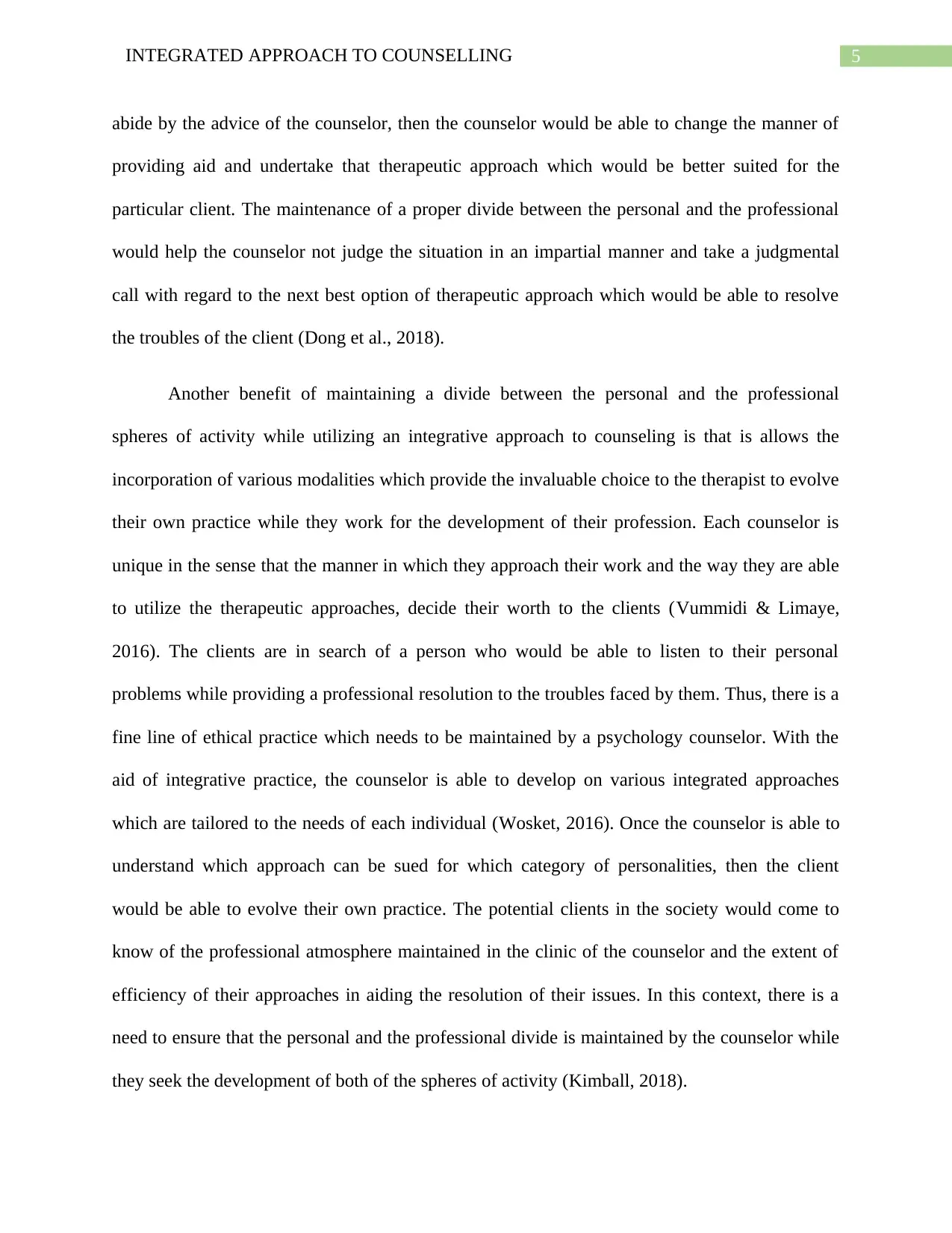
5INTEGRATED APPROACH TO COUNSELLING
abide by the advice of the counselor, then the counselor would be able to change the manner of
providing aid and undertake that therapeutic approach which would be better suited for the
particular client. The maintenance of a proper divide between the personal and the professional
would help the counselor not judge the situation in an impartial manner and take a judgmental
call with regard to the next best option of therapeutic approach which would be able to resolve
the troubles of the client (Dong et al., 2018).
Another benefit of maintaining a divide between the personal and the professional
spheres of activity while utilizing an integrative approach to counseling is that is allows the
incorporation of various modalities which provide the invaluable choice to the therapist to evolve
their own practice while they work for the development of their profession. Each counselor is
unique in the sense that the manner in which they approach their work and the way they are able
to utilize the therapeutic approaches, decide their worth to the clients (Vummidi & Limaye,
2016). The clients are in search of a person who would be able to listen to their personal
problems while providing a professional resolution to the troubles faced by them. Thus, there is a
fine line of ethical practice which needs to be maintained by a psychology counselor. With the
aid of integrative practice, the counselor is able to develop on various integrated approaches
which are tailored to the needs of each individual (Wosket, 2016). Once the counselor is able to
understand which approach can be sued for which category of personalities, then the client
would be able to evolve their own practice. The potential clients in the society would come to
know of the professional atmosphere maintained in the clinic of the counselor and the extent of
efficiency of their approaches in aiding the resolution of their issues. In this context, there is a
need to ensure that the personal and the professional divide is maintained by the counselor while
they seek the development of both of the spheres of activity (Kimball, 2018).
abide by the advice of the counselor, then the counselor would be able to change the manner of
providing aid and undertake that therapeutic approach which would be better suited for the
particular client. The maintenance of a proper divide between the personal and the professional
would help the counselor not judge the situation in an impartial manner and take a judgmental
call with regard to the next best option of therapeutic approach which would be able to resolve
the troubles of the client (Dong et al., 2018).
Another benefit of maintaining a divide between the personal and the professional
spheres of activity while utilizing an integrative approach to counseling is that is allows the
incorporation of various modalities which provide the invaluable choice to the therapist to evolve
their own practice while they work for the development of their profession. Each counselor is
unique in the sense that the manner in which they approach their work and the way they are able
to utilize the therapeutic approaches, decide their worth to the clients (Vummidi & Limaye,
2016). The clients are in search of a person who would be able to listen to their personal
problems while providing a professional resolution to the troubles faced by them. Thus, there is a
fine line of ethical practice which needs to be maintained by a psychology counselor. With the
aid of integrative practice, the counselor is able to develop on various integrated approaches
which are tailored to the needs of each individual (Wosket, 2016). Once the counselor is able to
understand which approach can be sued for which category of personalities, then the client
would be able to evolve their own practice. The potential clients in the society would come to
know of the professional atmosphere maintained in the clinic of the counselor and the extent of
efficiency of their approaches in aiding the resolution of their issues. In this context, there is a
need to ensure that the personal and the professional divide is maintained by the counselor while
they seek the development of both of the spheres of activity (Kimball, 2018).
⊘ This is a preview!⊘
Do you want full access?
Subscribe today to unlock all pages.

Trusted by 1+ million students worldwide
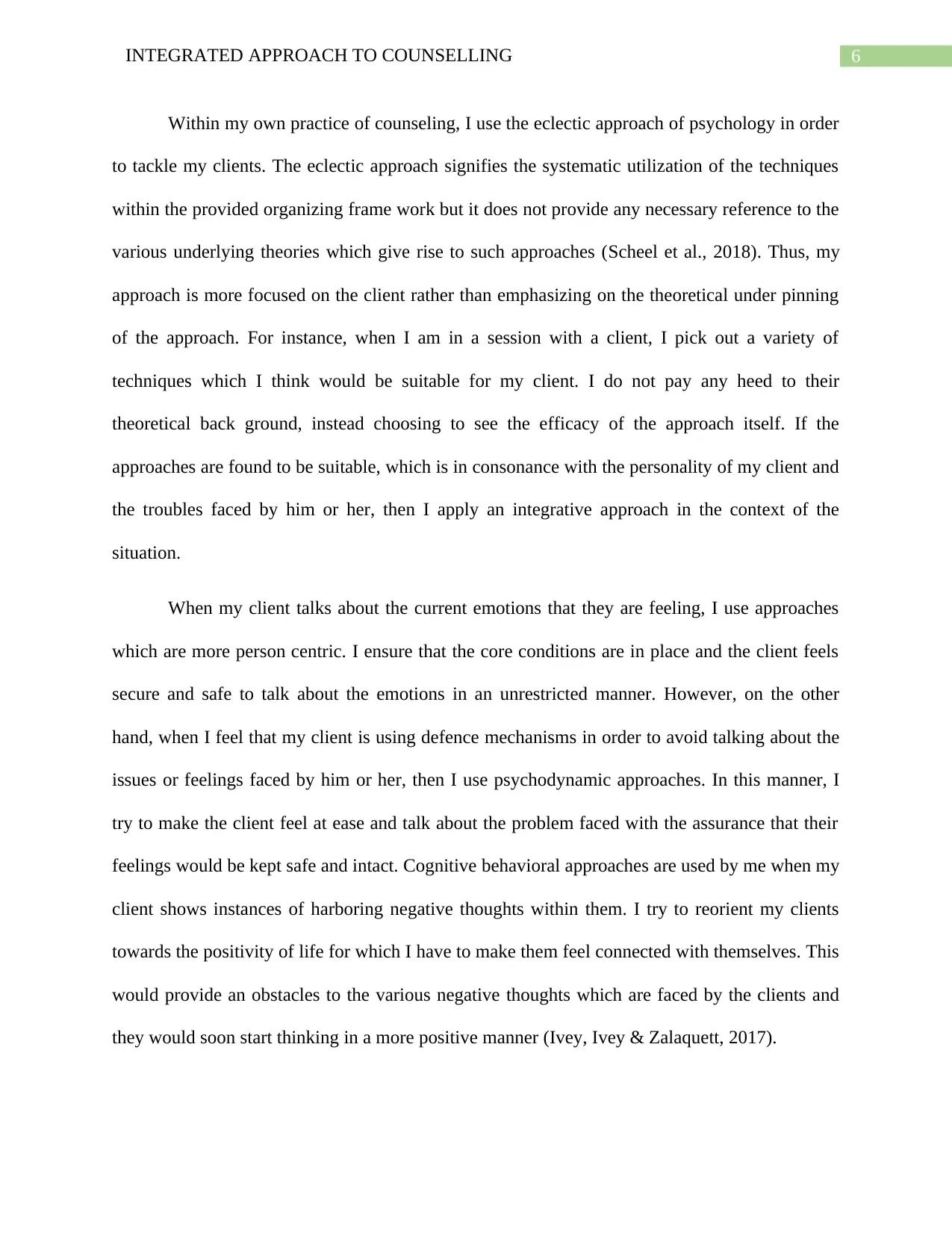
6INTEGRATED APPROACH TO COUNSELLING
Within my own practice of counseling, I use the eclectic approach of psychology in order
to tackle my clients. The eclectic approach signifies the systematic utilization of the techniques
within the provided organizing frame work but it does not provide any necessary reference to the
various underlying theories which give rise to such approaches (Scheel et al., 2018). Thus, my
approach is more focused on the client rather than emphasizing on the theoretical under pinning
of the approach. For instance, when I am in a session with a client, I pick out a variety of
techniques which I think would be suitable for my client. I do not pay any heed to their
theoretical back ground, instead choosing to see the efficacy of the approach itself. If the
approaches are found to be suitable, which is in consonance with the personality of my client and
the troubles faced by him or her, then I apply an integrative approach in the context of the
situation.
When my client talks about the current emotions that they are feeling, I use approaches
which are more person centric. I ensure that the core conditions are in place and the client feels
secure and safe to talk about the emotions in an unrestricted manner. However, on the other
hand, when I feel that my client is using defence mechanisms in order to avoid talking about the
issues or feelings faced by him or her, then I use psychodynamic approaches. In this manner, I
try to make the client feel at ease and talk about the problem faced with the assurance that their
feelings would be kept safe and intact. Cognitive behavioral approaches are used by me when my
client shows instances of harboring negative thoughts within them. I try to reorient my clients
towards the positivity of life for which I have to make them feel connected with themselves. This
would provide an obstacles to the various negative thoughts which are faced by the clients and
they would soon start thinking in a more positive manner (Ivey, Ivey & Zalaquett, 2017).
Within my own practice of counseling, I use the eclectic approach of psychology in order
to tackle my clients. The eclectic approach signifies the systematic utilization of the techniques
within the provided organizing frame work but it does not provide any necessary reference to the
various underlying theories which give rise to such approaches (Scheel et al., 2018). Thus, my
approach is more focused on the client rather than emphasizing on the theoretical under pinning
of the approach. For instance, when I am in a session with a client, I pick out a variety of
techniques which I think would be suitable for my client. I do not pay any heed to their
theoretical back ground, instead choosing to see the efficacy of the approach itself. If the
approaches are found to be suitable, which is in consonance with the personality of my client and
the troubles faced by him or her, then I apply an integrative approach in the context of the
situation.
When my client talks about the current emotions that they are feeling, I use approaches
which are more person centric. I ensure that the core conditions are in place and the client feels
secure and safe to talk about the emotions in an unrestricted manner. However, on the other
hand, when I feel that my client is using defence mechanisms in order to avoid talking about the
issues or feelings faced by him or her, then I use psychodynamic approaches. In this manner, I
try to make the client feel at ease and talk about the problem faced with the assurance that their
feelings would be kept safe and intact. Cognitive behavioral approaches are used by me when my
client shows instances of harboring negative thoughts within them. I try to reorient my clients
towards the positivity of life for which I have to make them feel connected with themselves. This
would provide an obstacles to the various negative thoughts which are faced by the clients and
they would soon start thinking in a more positive manner (Ivey, Ivey & Zalaquett, 2017).
Paraphrase This Document
Need a fresh take? Get an instant paraphrase of this document with our AI Paraphraser
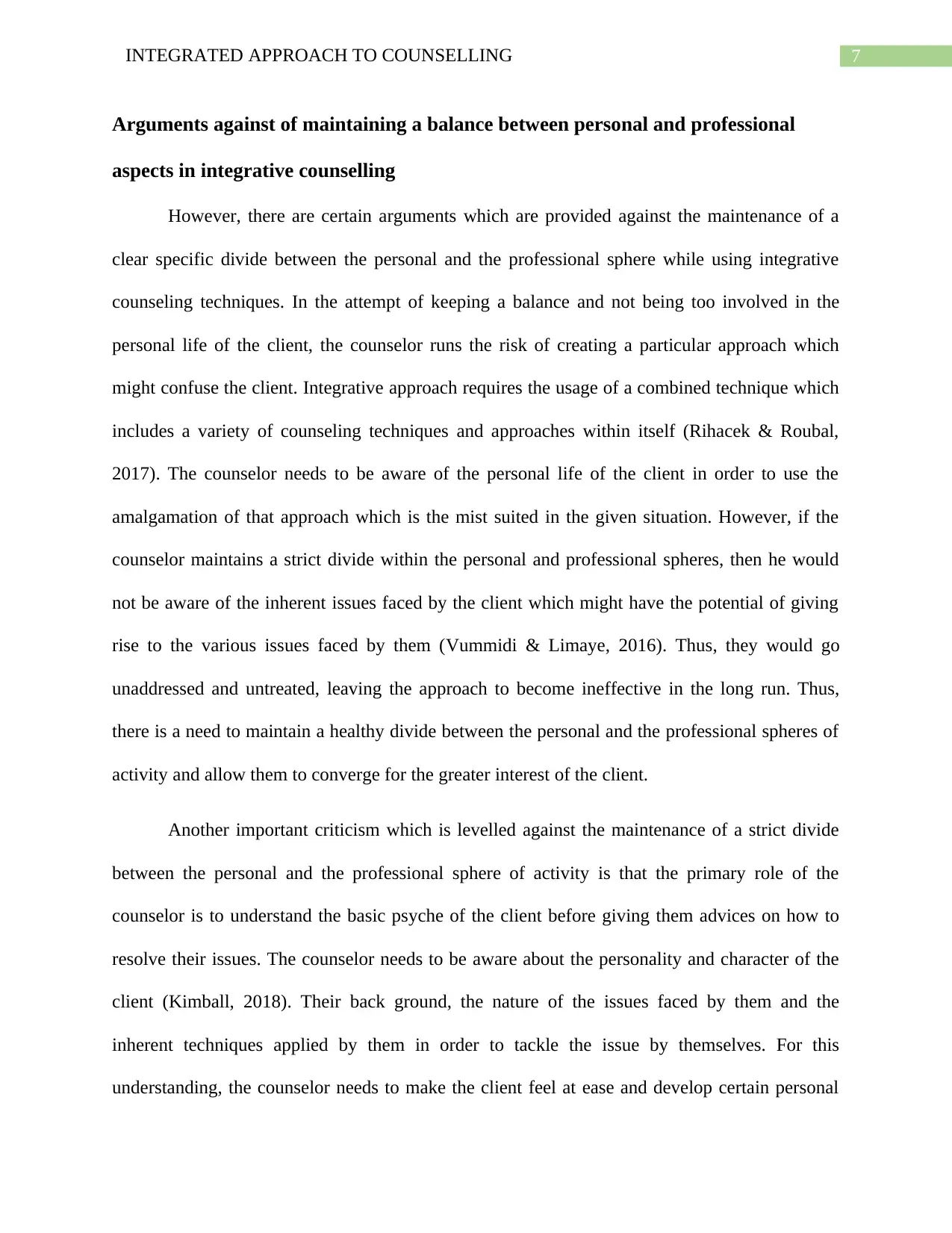
7INTEGRATED APPROACH TO COUNSELLING
Arguments against of maintaining a balance between personal and professional
aspects in integrative counselling
However, there are certain arguments which are provided against the maintenance of a
clear specific divide between the personal and the professional sphere while using integrative
counseling techniques. In the attempt of keeping a balance and not being too involved in the
personal life of the client, the counselor runs the risk of creating a particular approach which
might confuse the client. Integrative approach requires the usage of a combined technique which
includes a variety of counseling techniques and approaches within itself (Rihacek & Roubal,
2017). The counselor needs to be aware of the personal life of the client in order to use the
amalgamation of that approach which is the mist suited in the given situation. However, if the
counselor maintains a strict divide within the personal and professional spheres, then he would
not be aware of the inherent issues faced by the client which might have the potential of giving
rise to the various issues faced by them (Vummidi & Limaye, 2016). Thus, they would go
unaddressed and untreated, leaving the approach to become ineffective in the long run. Thus,
there is a need to maintain a healthy divide between the personal and the professional spheres of
activity and allow them to converge for the greater interest of the client.
Another important criticism which is levelled against the maintenance of a strict divide
between the personal and the professional sphere of activity is that the primary role of the
counselor is to understand the basic psyche of the client before giving them advices on how to
resolve their issues. The counselor needs to be aware about the personality and character of the
client (Kimball, 2018). Their back ground, the nature of the issues faced by them and the
inherent techniques applied by them in order to tackle the issue by themselves. For this
understanding, the counselor needs to make the client feel at ease and develop certain personal
Arguments against of maintaining a balance between personal and professional
aspects in integrative counselling
However, there are certain arguments which are provided against the maintenance of a
clear specific divide between the personal and the professional sphere while using integrative
counseling techniques. In the attempt of keeping a balance and not being too involved in the
personal life of the client, the counselor runs the risk of creating a particular approach which
might confuse the client. Integrative approach requires the usage of a combined technique which
includes a variety of counseling techniques and approaches within itself (Rihacek & Roubal,
2017). The counselor needs to be aware of the personal life of the client in order to use the
amalgamation of that approach which is the mist suited in the given situation. However, if the
counselor maintains a strict divide within the personal and professional spheres, then he would
not be aware of the inherent issues faced by the client which might have the potential of giving
rise to the various issues faced by them (Vummidi & Limaye, 2016). Thus, they would go
unaddressed and untreated, leaving the approach to become ineffective in the long run. Thus,
there is a need to maintain a healthy divide between the personal and the professional spheres of
activity and allow them to converge for the greater interest of the client.
Another important criticism which is levelled against the maintenance of a strict divide
between the personal and the professional sphere of activity is that the primary role of the
counselor is to understand the basic psyche of the client before giving them advices on how to
resolve their issues. The counselor needs to be aware about the personality and character of the
client (Kimball, 2018). Their back ground, the nature of the issues faced by them and the
inherent techniques applied by them in order to tackle the issue by themselves. For this
understanding, the counselor needs to make the client feel at ease and develop certain personal
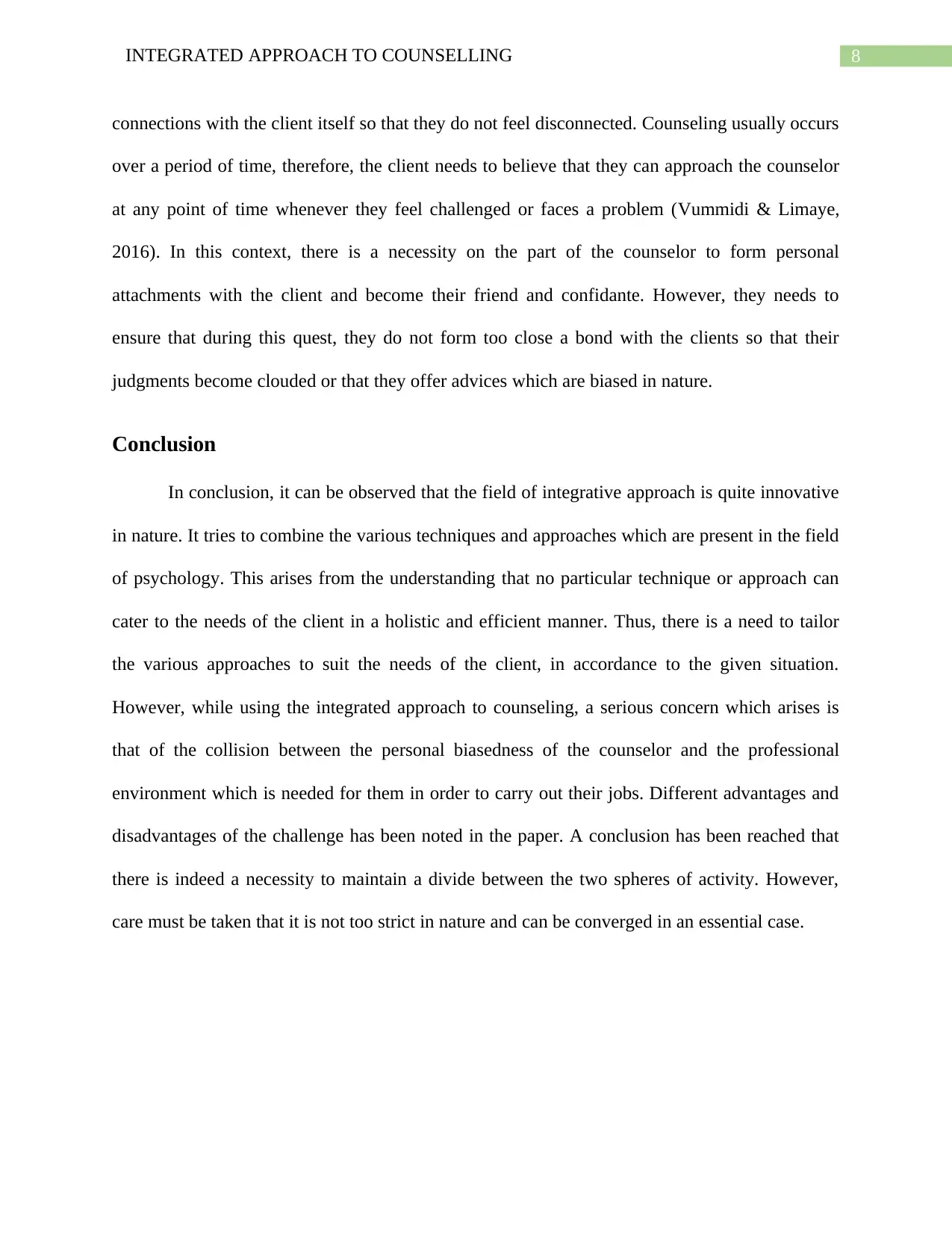
8INTEGRATED APPROACH TO COUNSELLING
connections with the client itself so that they do not feel disconnected. Counseling usually occurs
over a period of time, therefore, the client needs to believe that they can approach the counselor
at any point of time whenever they feel challenged or faces a problem (Vummidi & Limaye,
2016). In this context, there is a necessity on the part of the counselor to form personal
attachments with the client and become their friend and confidante. However, they needs to
ensure that during this quest, they do not form too close a bond with the clients so that their
judgments become clouded or that they offer advices which are biased in nature.
Conclusion
In conclusion, it can be observed that the field of integrative approach is quite innovative
in nature. It tries to combine the various techniques and approaches which are present in the field
of psychology. This arises from the understanding that no particular technique or approach can
cater to the needs of the client in a holistic and efficient manner. Thus, there is a need to tailor
the various approaches to suit the needs of the client, in accordance to the given situation.
However, while using the integrated approach to counseling, a serious concern which arises is
that of the collision between the personal biasedness of the counselor and the professional
environment which is needed for them in order to carry out their jobs. Different advantages and
disadvantages of the challenge has been noted in the paper. A conclusion has been reached that
there is indeed a necessity to maintain a divide between the two spheres of activity. However,
care must be taken that it is not too strict in nature and can be converged in an essential case.
connections with the client itself so that they do not feel disconnected. Counseling usually occurs
over a period of time, therefore, the client needs to believe that they can approach the counselor
at any point of time whenever they feel challenged or faces a problem (Vummidi & Limaye,
2016). In this context, there is a necessity on the part of the counselor to form personal
attachments with the client and become their friend and confidante. However, they needs to
ensure that during this quest, they do not form too close a bond with the clients so that their
judgments become clouded or that they offer advices which are biased in nature.
Conclusion
In conclusion, it can be observed that the field of integrative approach is quite innovative
in nature. It tries to combine the various techniques and approaches which are present in the field
of psychology. This arises from the understanding that no particular technique or approach can
cater to the needs of the client in a holistic and efficient manner. Thus, there is a need to tailor
the various approaches to suit the needs of the client, in accordance to the given situation.
However, while using the integrated approach to counseling, a serious concern which arises is
that of the collision between the personal biasedness of the counselor and the professional
environment which is needed for them in order to carry out their jobs. Different advantages and
disadvantages of the challenge has been noted in the paper. A conclusion has been reached that
there is indeed a necessity to maintain a divide between the two spheres of activity. However,
care must be taken that it is not too strict in nature and can be converged in an essential case.
⊘ This is a preview!⊘
Do you want full access?
Subscribe today to unlock all pages.

Trusted by 1+ million students worldwide
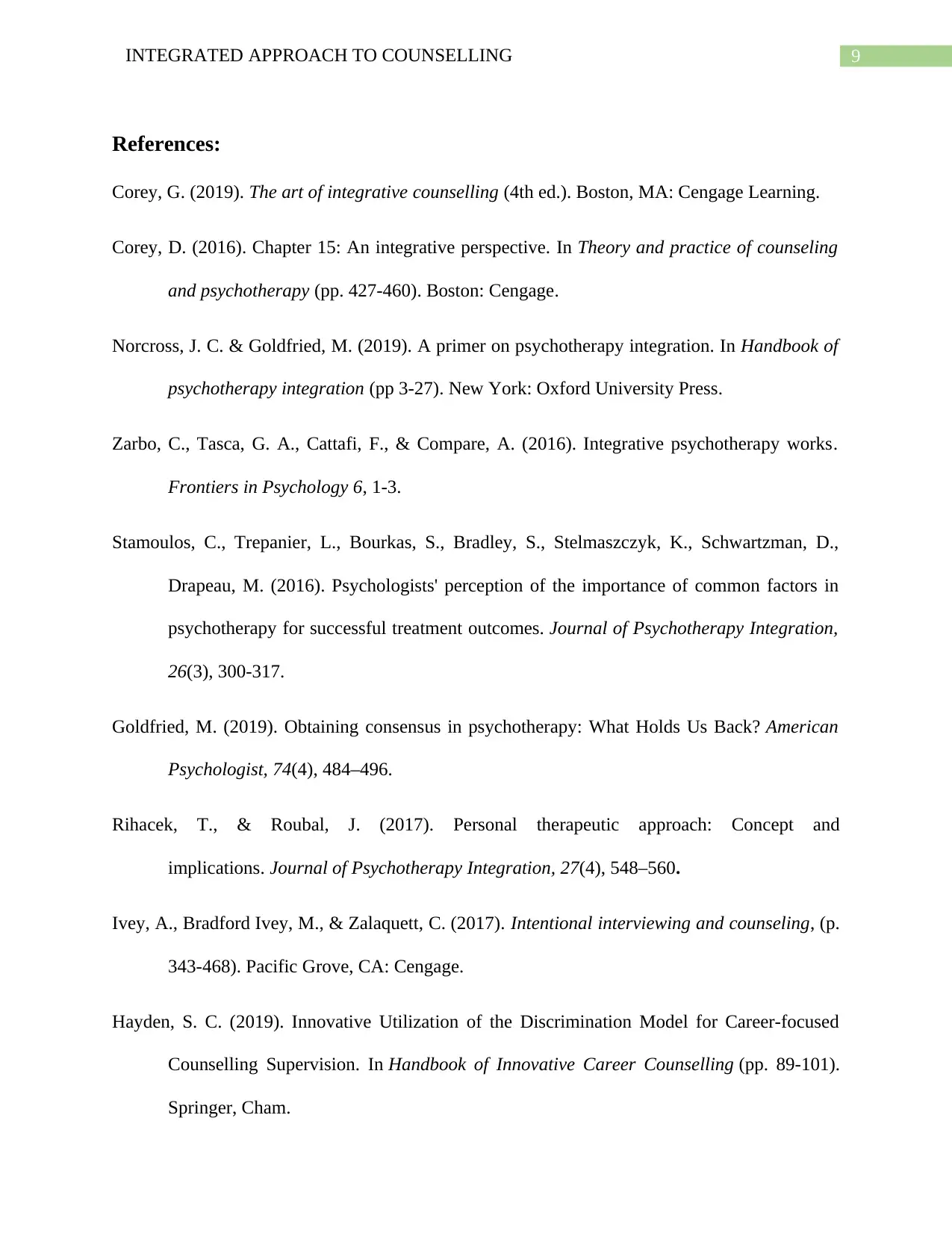
9INTEGRATED APPROACH TO COUNSELLING
References:
Corey, G. (2019). The art of integrative counselling (4th ed.). Boston, MA: Cengage Learning.
Corey, D. (2016). Chapter 15: An integrative perspective. In Theory and practice of counseling
and psychotherapy (pp. 427-460). Boston: Cengage.
Norcross, J. C. & Goldfried, M. (2019). A primer on psychotherapy integration. In Handbook of
psychotherapy integration (pp 3-27). New York: Oxford University Press.
Zarbo, C., Tasca, G. A., Cattafi, F., & Compare, A. (2016). Integrative psychotherapy works.
Frontiers in Psychology 6, 1-3.
Stamoulos, C., Trepanier, L., Bourkas, S., Bradley, S., Stelmaszczyk, K., Schwartzman, D.,
Drapeau, M. (2016). Psychologists' perception of the importance of common factors in
psychotherapy for successful treatment outcomes. Journal of Psychotherapy Integration,
26(3), 300-317.
Goldfried, M. (2019). Obtaining consensus in psychotherapy: What Holds Us Back? American
Psychologist, 74(4), 484–496.
Rihacek, T., & Roubal, J. (2017). Personal therapeutic approach: Concept and
implications. Journal of Psychotherapy Integration, 27(4), 548–560.
Ivey, A., Bradford Ivey, M., & Zalaquett, C. (2017). Intentional interviewing and counseling, (p.
343-468). Pacific Grove, CA: Cengage.
Hayden, S. C. (2019). Innovative Utilization of the Discrimination Model for Career-focused
Counselling Supervision. In Handbook of Innovative Career Counselling (pp. 89-101).
Springer, Cham.
References:
Corey, G. (2019). The art of integrative counselling (4th ed.). Boston, MA: Cengage Learning.
Corey, D. (2016). Chapter 15: An integrative perspective. In Theory and practice of counseling
and psychotherapy (pp. 427-460). Boston: Cengage.
Norcross, J. C. & Goldfried, M. (2019). A primer on psychotherapy integration. In Handbook of
psychotherapy integration (pp 3-27). New York: Oxford University Press.
Zarbo, C., Tasca, G. A., Cattafi, F., & Compare, A. (2016). Integrative psychotherapy works.
Frontiers in Psychology 6, 1-3.
Stamoulos, C., Trepanier, L., Bourkas, S., Bradley, S., Stelmaszczyk, K., Schwartzman, D.,
Drapeau, M. (2016). Psychologists' perception of the importance of common factors in
psychotherapy for successful treatment outcomes. Journal of Psychotherapy Integration,
26(3), 300-317.
Goldfried, M. (2019). Obtaining consensus in psychotherapy: What Holds Us Back? American
Psychologist, 74(4), 484–496.
Rihacek, T., & Roubal, J. (2017). Personal therapeutic approach: Concept and
implications. Journal of Psychotherapy Integration, 27(4), 548–560.
Ivey, A., Bradford Ivey, M., & Zalaquett, C. (2017). Intentional interviewing and counseling, (p.
343-468). Pacific Grove, CA: Cengage.
Hayden, S. C. (2019). Innovative Utilization of the Discrimination Model for Career-focused
Counselling Supervision. In Handbook of Innovative Career Counselling (pp. 89-101).
Springer, Cham.
Paraphrase This Document
Need a fresh take? Get an instant paraphrase of this document with our AI Paraphraser
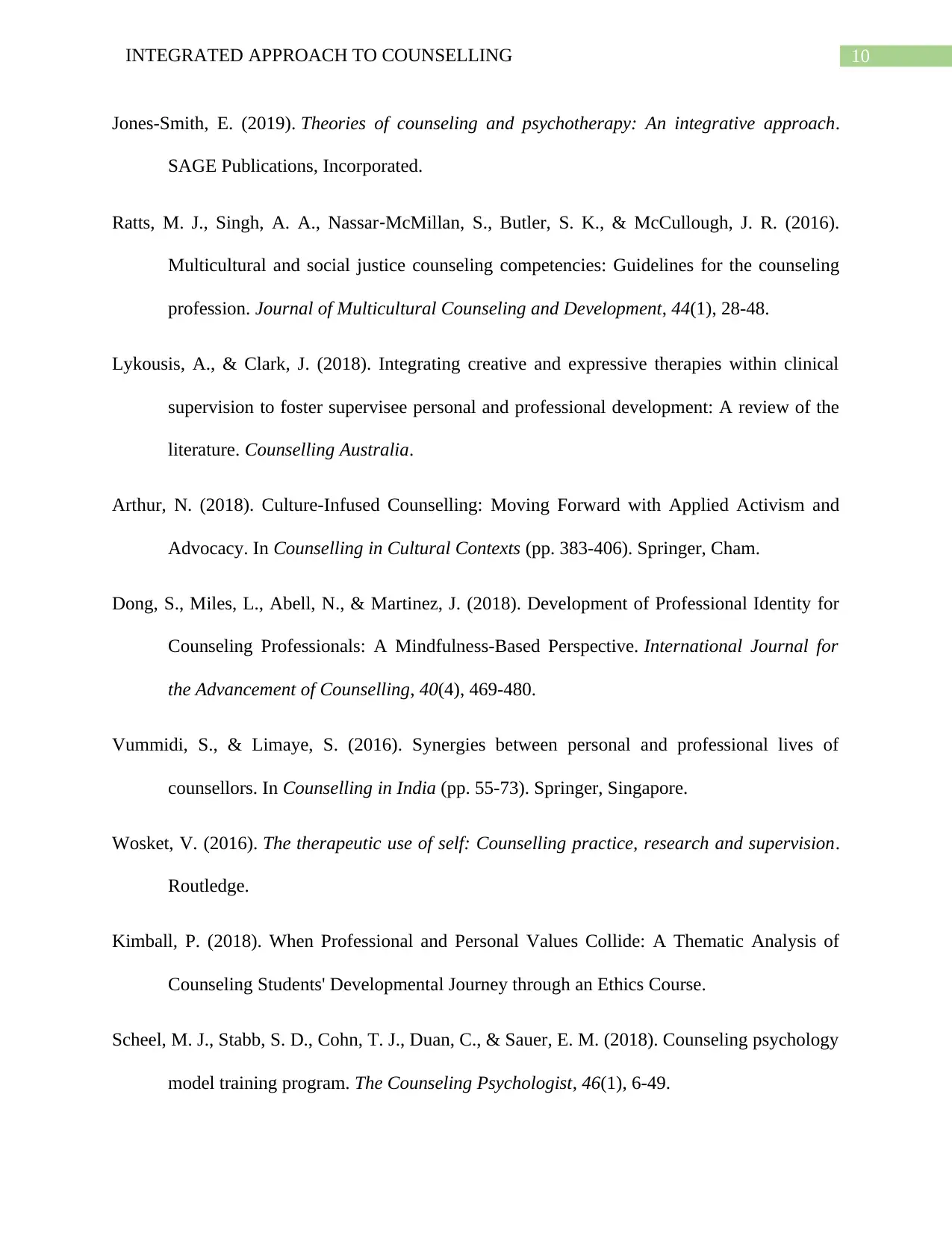
10INTEGRATED APPROACH TO COUNSELLING
Jones-Smith, E. (2019). Theories of counseling and psychotherapy: An integrative approach.
SAGE Publications, Incorporated.
Ratts, M. J., Singh, A. A., Nassar‐McMillan, S., Butler, S. K., & McCullough, J. R. (2016).
Multicultural and social justice counseling competencies: Guidelines for the counseling
profession. Journal of Multicultural Counseling and Development, 44(1), 28-48.
Lykousis, A., & Clark, J. (2018). Integrating creative and expressive therapies within clinical
supervision to foster supervisee personal and professional development: A review of the
literature. Counselling Australia.
Arthur, N. (2018). Culture-Infused Counselling: Moving Forward with Applied Activism and
Advocacy. In Counselling in Cultural Contexts (pp. 383-406). Springer, Cham.
Dong, S., Miles, L., Abell, N., & Martinez, J. (2018). Development of Professional Identity for
Counseling Professionals: A Mindfulness-Based Perspective. International Journal for
the Advancement of Counselling, 40(4), 469-480.
Vummidi, S., & Limaye, S. (2016). Synergies between personal and professional lives of
counsellors. In Counselling in India (pp. 55-73). Springer, Singapore.
Wosket, V. (2016). The therapeutic use of self: Counselling practice, research and supervision.
Routledge.
Kimball, P. (2018). When Professional and Personal Values Collide: A Thematic Analysis of
Counseling Students' Developmental Journey through an Ethics Course.
Scheel, M. J., Stabb, S. D., Cohn, T. J., Duan, C., & Sauer, E. M. (2018). Counseling psychology
model training program. The Counseling Psychologist, 46(1), 6-49.
Jones-Smith, E. (2019). Theories of counseling and psychotherapy: An integrative approach.
SAGE Publications, Incorporated.
Ratts, M. J., Singh, A. A., Nassar‐McMillan, S., Butler, S. K., & McCullough, J. R. (2016).
Multicultural and social justice counseling competencies: Guidelines for the counseling
profession. Journal of Multicultural Counseling and Development, 44(1), 28-48.
Lykousis, A., & Clark, J. (2018). Integrating creative and expressive therapies within clinical
supervision to foster supervisee personal and professional development: A review of the
literature. Counselling Australia.
Arthur, N. (2018). Culture-Infused Counselling: Moving Forward with Applied Activism and
Advocacy. In Counselling in Cultural Contexts (pp. 383-406). Springer, Cham.
Dong, S., Miles, L., Abell, N., & Martinez, J. (2018). Development of Professional Identity for
Counseling Professionals: A Mindfulness-Based Perspective. International Journal for
the Advancement of Counselling, 40(4), 469-480.
Vummidi, S., & Limaye, S. (2016). Synergies between personal and professional lives of
counsellors. In Counselling in India (pp. 55-73). Springer, Singapore.
Wosket, V. (2016). The therapeutic use of self: Counselling practice, research and supervision.
Routledge.
Kimball, P. (2018). When Professional and Personal Values Collide: A Thematic Analysis of
Counseling Students' Developmental Journey through an Ethics Course.
Scheel, M. J., Stabb, S. D., Cohn, T. J., Duan, C., & Sauer, E. M. (2018). Counseling psychology
model training program. The Counseling Psychologist, 46(1), 6-49.

11INTEGRATED APPROACH TO COUNSELLING
⊘ This is a preview!⊘
Do you want full access?
Subscribe today to unlock all pages.

Trusted by 1+ million students worldwide
1 out of 12
Related Documents
Your All-in-One AI-Powered Toolkit for Academic Success.
+13062052269
info@desklib.com
Available 24*7 on WhatsApp / Email
![[object Object]](/_next/static/media/star-bottom.7253800d.svg)
Unlock your academic potential
Copyright © 2020–2026 A2Z Services. All Rights Reserved. Developed and managed by ZUCOL.





